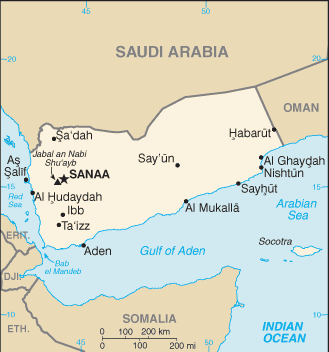A nation with little arable land, Yemen has long had to import some 90% of its food from abroad. This has traditionally meant ships, but with a Saudi-led naval blockade of the entire Yemeni coast for the past several months, it’s not easy to get those ships into port.
 Many shipping companies have pulled out, since trying to deliver to Yemen means endless delays from the naval forces off the coast. Those who continue to try to deliver food warn of a growing risk of famine, particularly in the north, where the blockade is preventing virtually all shipments.
Many shipping companies have pulled out, since trying to deliver to Yemen means endless delays from the naval forces off the coast. Those who continue to try to deliver food warn of a growing risk of famine, particularly in the north, where the blockade is preventing virtually all shipments.
23 ships are parked off the cost of Hodeida alone, with no indication when or even if they’ll be allowed to dock. Even when they’re given the go-ahead, it’s difficult to make their deliveries since Saudi warplanes destroyed much of the port’s infrastructure in airstrikes, including the cranes that would usually lift huge cargoes of grain off the ships.
The US Navy issued a report warning that some 14 million Yemenis could be left without basic foods because of the blockade, adding that the blockade countries aren’t offer clear explanation of the holdup, even though most of the ships are from Europe and the US.
It is noteworthy that while the US Navy is grousing about the blockade they have actually taken part in it at times, nominally to prevent “Iranian weapons” from being smuggled to Yemen. The US remains involved in the war, but not directly in the blockade right now.
Earlier this week, a pair of Indian ships got tired of waiting and attempted to run the blockade and deliver fuel to one of the ports near Hodeida, they were attacked by the warplanes, and 20 Indian citizens were killed in the attacks.


